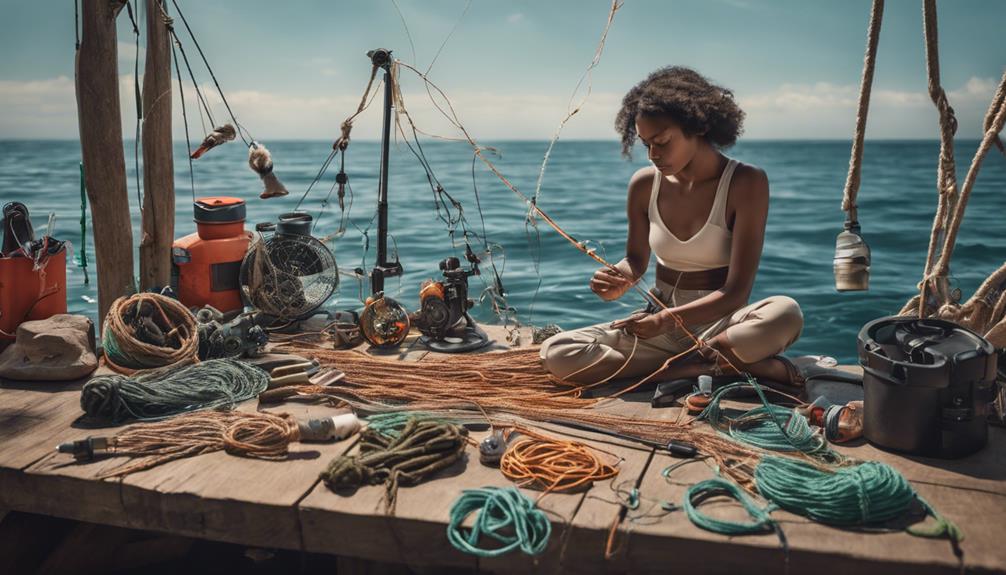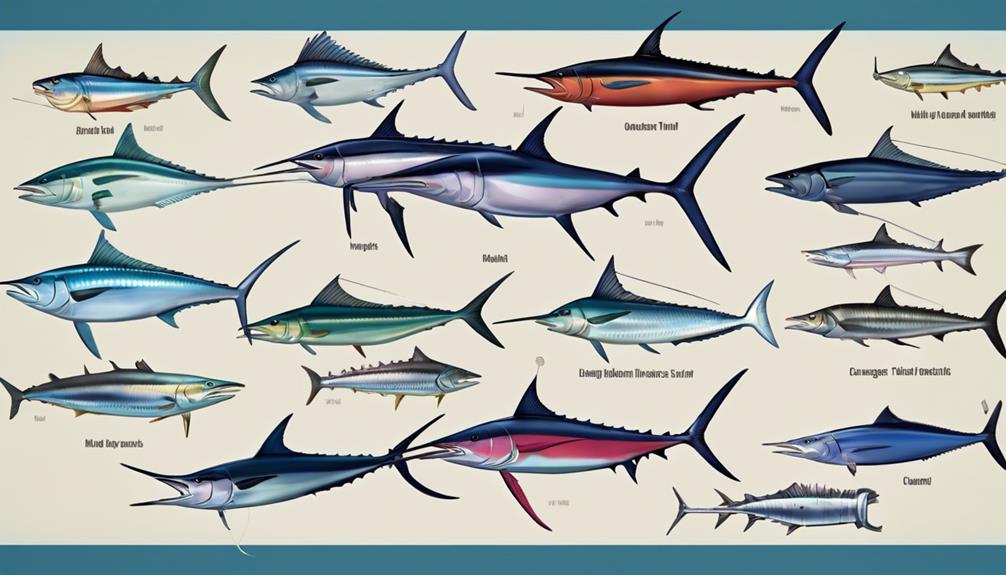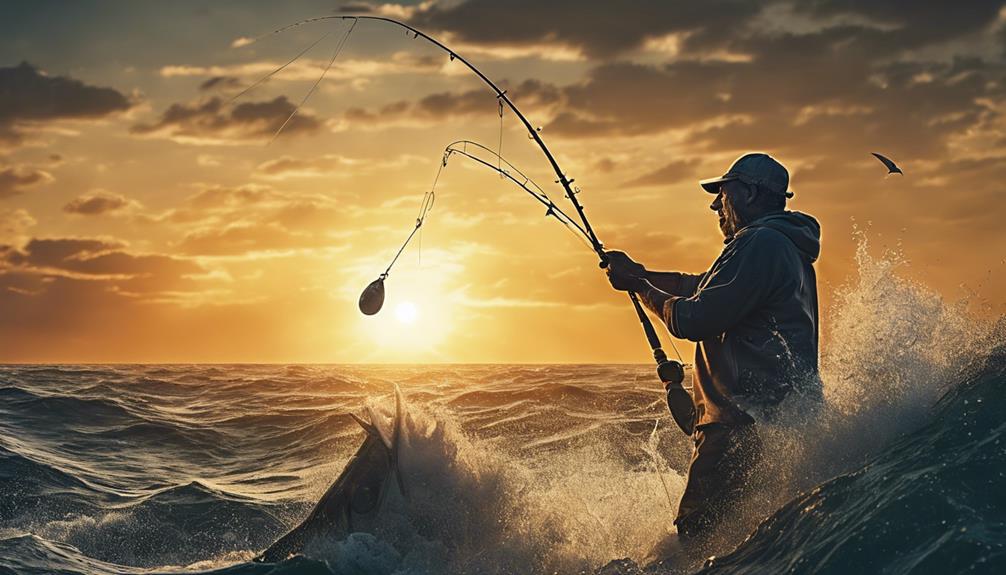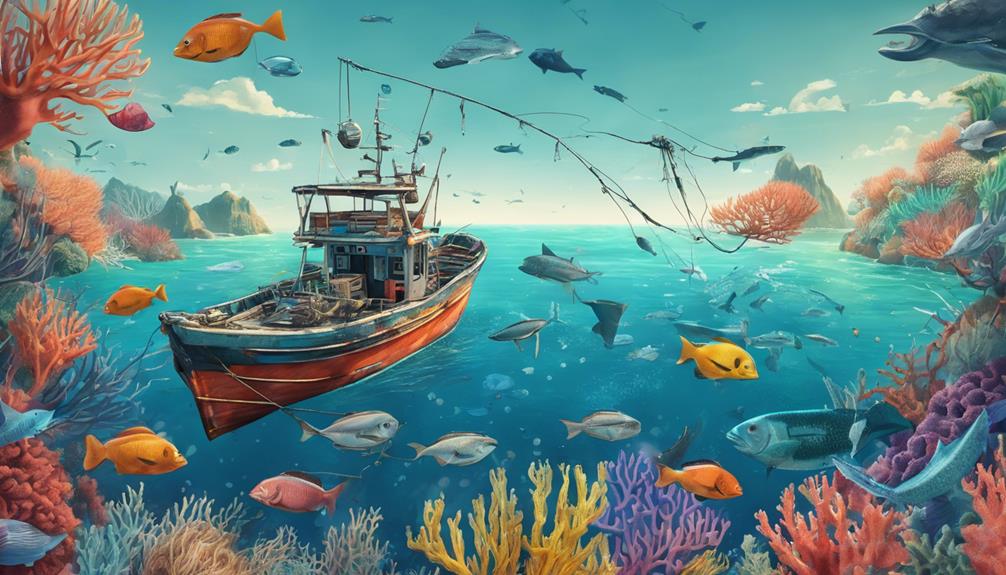Have you ever wondered what it takes to become a certified deep-sea fishing expert? The journey to obtaining your certification involves a series of carefully planned steps that will not only enhance your skills but also provide you with the necessary knowledge to excel in this thrilling adventure.
So, if you're ready to embark on this rewarding path, let's explore the key components that will guide you towards your deep-sea fishing certification.
Understanding Certification Requirements
To obtain deep sea fishing certification, you must first understand the specific requirements set by the certifying body. Understanding eligibility is the initial step in the certification process. Eligibility criteria typically involve age restrictions, prerequisites such as CPR certification, and sometimes a certain number of logged diving hours. Ensuring you meet these requirements is crucial before proceeding further.
The certification process itself is multifaceted. It usually includes a combination of theoretical knowledge assessments and practical skills evaluations. The certifying body may require you to pass written exams covering topics like marine conservation, fishing regulations, and emergency procedures. Additionally, you may need to demonstrate your abilities in tasks such as setting up fishing equipment, identifying marine species, and handling emergency situations effectively.
It is essential to thoroughly review the certification requirements and process outlined by the certifying body. This ensures you're adequately prepared to meet all expectations and successfully obtain your deep sea fishing certification. By familiarizing yourself with the eligibility criteria and understanding the certification process, you can approach the certification journey with confidence and clarity. Remember, each certification body may have slightly different requirements, so attention to detail is paramount in this process.
Choosing an Accredited Program
When considering which deep sea fishing certification program to enroll in, prioritize those accredited by reputable organizations. Accredited programs ensure that you receive quality training and that your certification will be recognized within the industry. Before making a decision, research the accreditation of the programs you're interested in to confirm their legitimacy.
Accredited programs have met specific standards set by governing bodies or industry associations, ensuring that they provide comprehensive and up-to-date training. These programs often have eligibility criteria that you must meet before enrolling. Common requirements may include a minimum age, physical fitness levels, and sometimes prerequisites like basic boating knowledge or CPR certification. Make sure you review these criteria to determine if you're eligible for the program.
Completing Training Courses
Ensure you actively participate in all training courses to maximize your learning and skill development. The training courses are designed to equip you with the necessary knowledge and practical skills for deep-sea fishing. Here are some key aspects to focus on during your training:
- Hands-On Techniques: Engage in practical sessions where you can learn hands-on techniques for handling fishing equipment, baiting hooks, and reeling in catches. This experiential learning will help you become more proficient in your fishing abilities.
- Safety Protocols: Pay close attention to safety instructions and protocols provided during the training. Understanding how to respond to emergencies, navigate rough waters, and handle fishing equipment safely is crucial for your well-being and the well-being of others on board.
- Expert Guidance: Take advantage of the expertise of your instructors. They can offer valuable insights, tips, and tricks based on their experiences in deep-sea fishing. Don't hesitate to ask questions and seek clarification to enhance your learning process.
- Real-World Scenarios: Practice in simulated real-world scenarios to prepare yourself for the challenges you may face out at sea. These scenarios will help you develop problem-solving skills and adaptability, essential for a successful deep-sea fishing experience.
Passing the Certification Exam
Demonstrate proficiency in deep-sea fishing skills by successfully passing the certification exam. Exam preparation is key to ensuring you're ready for the test. Begin by familiarizing yourself with the exam format and content outline provided by the certifying body. This will give you a clear understanding of what to expect and where to focus your studies.
To excel in the certification exam, consider creating a study schedule that allows you to cover all relevant topics. Allocate specific time slots for each subject area, such as deep-sea fishing regulations, safety procedures, navigation techniques, and species identification. Utilize study materials like textbooks, online resources, and practice exams to enhance your knowledge and test-taking skills.
Effective study tips include practicing problem-solving questions related to deep-sea fishing scenarios and discussing complex topics with experienced fishermen or instructors. Engaging in hands-on practice whenever possible can also reinforce your understanding of practical skills required for deep-sea fishing.
Prior to the exam, ensure you get enough rest and arrive prepared with all necessary materials, such as identification documents and writing utensils. By following these exam preparation strategies and study tips, you'll be well-equipped to pass the certification exam and demonstrate your deep-sea fishing expertise.
Submitting Application and Fees
To proceed with obtaining your deep-sea fishing certification, the next step involves submitting your application along with the required fees. The application process is straightforward and can be completed online or by mail.
Here are some key points to keep in mind:
- Fill out the application form accurately, providing all the necessary information such as your name, contact details, and any relevant fishing experience.
- Double-check your application for any errors or missing information before submission to avoid delays in processing.
- Ensure that you include the required fees along with your application. The fee payment is typically done through secure online portals or by mailing a check or money order.
- Once your application and fees are received, you'll be notified about the next steps in the certification process. Be sure to keep an eye on your email or mailbox for any updates.
Gaining Practical Experience
Start by actively engaging in fishing expeditions to gain practical experience in deep-sea fishing. Building skills in deep-sea fishing requires hands-on practice in various fishing techniques, understanding different bait types, and learning how to navigate the open waters effectively. To gain confidence in your abilities, consider joining fishing charters or expeditions led by experienced captains who can provide guidance and share their knowledge with you. These opportunities not only allow you to learn from seasoned professionals but also enable you to apply theoretical knowledge in real-life fishing scenarios.
During these fishing trips, observe how experienced anglers handle different situations, such as reeling in large catches or navigating through changing weather conditions. Practice casting your line accurately and efficiently to improve your chances of success when targeting deep-sea species. Additionally, take note of safety protocols and emergency procedures while out at sea to ensure a secure fishing experience.
Obtaining Recommendations
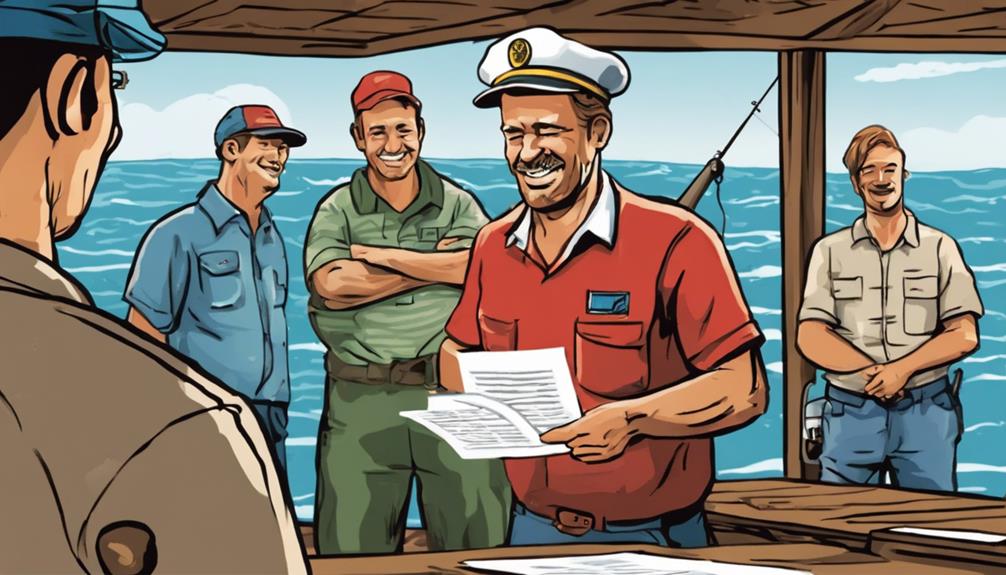
Consider seeking recommendations from experienced deep-sea fishermen who can attest to your skills and dedication in the field. These recommendations are crucial in the process of obtaining your deep-sea fishing certification. To help you secure those important endorsements, here are some actionable steps you can take:
- Finding Mentors: Look for seasoned professionals in the deep-sea fishing industry who are willing to mentor you. Establishing a mentor-mentee relationship can't only provide you with valuable guidance but can also lead to strong recommendations when the time comes.
- Networking Opportunities: Attend industry events, workshops, and seminars to expand your network. Building meaningful connections within the deep-sea fishing community can open doors to potential recommenders who've witnessed your passion and expertise firsthand.
- Joining Professional Organizations: Become a member of deep-sea fishing associations or clubs where you can interact with other enthusiasts and professionals. Engaging with like-minded individuals can help you find mentors who are willing to vouch for your skills.
- Volunteering or Interning: Offer your assistance to experienced deep-sea fishermen or organizations. By volunteering or interning, you not only gain practical experience but also increase your chances of receiving strong recommendations from those you work with.
Maintaining Certification Status
Once certified, ensure you regularly meet the requirements to maintain your deep-sea fishing certification status. Maintaining eligibility is crucial to continue enjoying the benefits of being a certified deep-sea fisherman. To achieve this, make sure to renew your credentials on time. Keeping your certification active involves staying up to date with any necessary renewals or continuing education requirements. It's essential to monitor expiration dates and plan ahead to complete any mandatory training or assessments.
To maintain eligibility, stay informed about any changes in regulations or policies that may affect your certification status. Regularly check for updates from the certifying body to ensure you're aware of any new requirements or procedures. By staying proactive and informed, you can avoid any lapses in your certification status.
Renewing credentials promptly is key to demonstrating your commitment to the deep-sea fishing industry. By completing the necessary steps to renew your certification, you showcase your dedication to upholding the standards of the profession. Additionally, maintaining an active certification status can open up opportunities for career advancement and professional growth within the deep-sea fishing community.
Frequently Asked Questions
Can I Obtain Deep Sea Fishing Certification Online, or Is It Only Available Through In-Person Training Programs?
Yes, you can obtain deep sea fishing certification online. Some programs offer certification through online courses. However, in-person training programs are also available for those who prefer hands-on learning.
Make sure to check the certification's validity abroad if you plan to fish internationally. Additionally, keep in mind that there may be age requirements for obtaining deep sea fishing certification, so be sure to review those before enrolling in a program.
Are There Any Age Restrictions for Obtaining Deep Sea Fishing Certification?
Age restrictions for deep sea fishing certification vary by location, but generally, you must be a certain age to be eligible. Online training options may have age requirements as well, so make sure to check before enrolling.
Ensure you meet any age restrictions set by the certification program to avoid any issues down the line. Keep in mind that these restrictions are in place to ensure your safety and the safety of others while out at sea.
How Long Does It Typically Take to Complete All the Training Courses Required for Certification?
Typically, it takes a few weeks to several months to complete all the training courses required for deep sea fishing certification. The duration varies depending on how quickly you grasp the material and how frequently the courses are offered.
The certification process involves learning about safety protocols, fishing techniques, and regulations. It's important to dedicate time and effort to fully understand and apply the knowledge gained during the training.
Are There Any Additional Costs or Fees Associated With Maintaining Certification Status After Passing the Exam?
After passing the exam, there may be additional costs and renewal fees associated with maintaining your certification status. These expenses could vary depending on the certification program's requirements and duration.
It's important to stay informed about any potential costs to ensure you can continue enjoying the benefits of being a certified deep-sea fisherman. Be prepared to budget for these fees to keep your certification current and valid.
Can I Use My Deep Sea Fishing Certification in Other Countries, or Is It Only Valid in the Country Where I Obtained It?
Yes, your deep sea fishing certification can be used in other countries. It has international recognition and validity abroad, so you can fish in different locations with it. Some countries may have reciprocal agreements for cross border recognition of certifications.
Just make sure to check the specific regulations in the country you plan to fish in to ensure your certification is accepted there.
Conclusion
Now that you have completed the 5 steps to deep sea fishing certification, you're well on your way to becoming a certified deep sea fishing expert.
Remember to continue gaining practical experience, obtaining recommendations, and maintaining your certification status.
With your certification in hand, you can confidently pursue your passion for deep sea fishing and enjoy all the amazing opportunities that come with it.
Good luck on your fishing adventures!
